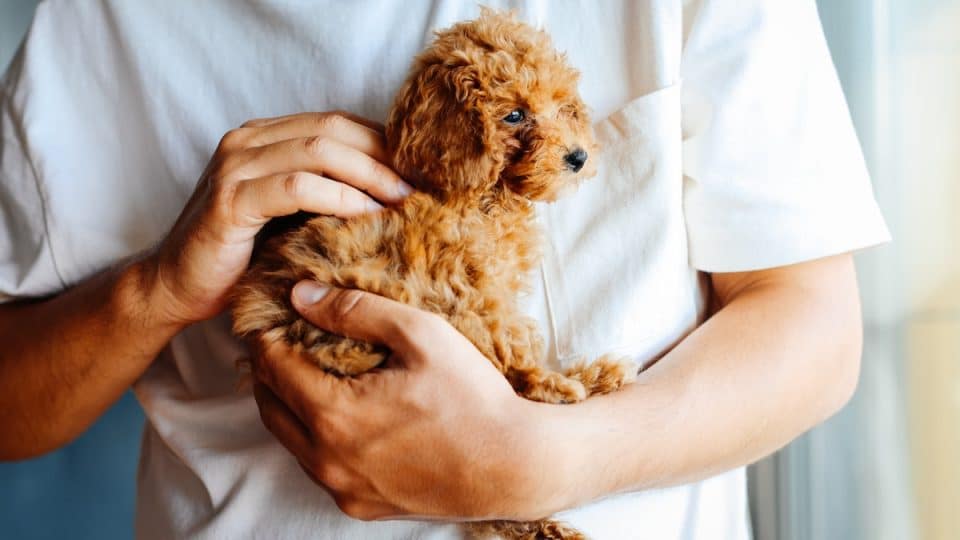You’ve been looking forward to getting a puppy for months, imagining days filled with cuddles, puppy kisses, and playtime. So, it catches you off-guard when your new arrival triggers a surge of negative emotions. Instead of joy, you’re grappling with exhaustion, anxiety, and maybe even a tinge of regret.
While it may not be what you expected, it’s natural to feel disappointed and alone when your expectations for puppyhood don’t match your current reality. This is called the ‘puppy blues’—a common phenomenon characterised by feelings of helplessness, sadness, doubt, and being overwhelmed.
The good news is that the puppy blues won’t last forever, and there are ways to alleviate the symptoms. To help new pet parents navigate the puppy blues, we spoke with Rachel Lane, certified behaviour consultant, dog trainer, and the owner of USA-based Leash & Learn.
Here’s what causes the puppy blues, how long they usually last, and ways you can minimise negative feelings in the meantime.
What Are the Puppy Blues?
The puppy blues are a negative emotional state many pet parents experience shortly after bringing home a new dog. Common symptoms of puppy blues include:
- sadness
- hopelessness
- frustration
- irritability and anger
- sleeplessness
- regret
- guilt
- feeling trapped
- trouble bonding with the new dog
Getting a new puppy is often painted as a positive, joyful event, but professional dog trainer Rachel Lane says it’s normal to feel depressed and cry a lot after getting a puppy. “There is information everywhere about how dogs are so good for people and bring so much joy into their lives. [But] many guardians feel alone when their puppy arrives and they are not having very much fun,” she explains.
Lane adds that she frequently receives tearful phone calls from distressed puppy parents. “The overwhelm, fatigue, and insecurity that a new puppy produces, along with their crying throughout the night, destruction, and house-soiling, often lead to these phone calls and emails.”

TatyanaGl via iStock
Why Do I Have the Puppy Blues?
Adjusting to the demands of caring for a dog can leave many new guardians longing for their pre-puppy life. You might even entertain thoughts of rehoming your new pup while experiencing puppy blues. Unsurprisingly, these feelings can hit first-time dog parents particularly hard.
Not only is a puppy a ton of work, but they also bring significant changes to your routine and social calendar. Spontaneous plans are out. Now, your schedule revolves around the needs of your new pet.
Lacking the confidence that comes with experience, many new guardians are also anxious about their ability to meet their puppy’s needs. Lane explains that new dog guardians are frequently unsure of what training to prioritise, what behaviours are age-appropriate, and what behaviours their puppy will eventually outgrow.
Everyone’s experience will look a little different, but Lane says three main factors cause the puppy blues.
1. Fatigue
Puppies are exhausting! Their energy levels are off the chart, daily messes are a given, and they need constant bathroom breaks—sometimes in the middle of the night. If it feels like you’ve taken on a second full-time job, you’re in the majority.
“Puppy guardians often get less sleep, have a more demanding schedule, and must perform a lot of extra cleaning compared to their pre-puppy life,” notes Lane.
2. Pressure
For many new pet parents, the knowledge that socialisation must take place within the first few months of a puppy’s life creates a sense of urgency and pressure—puppy blues anxiety. “Guardians want to do everything right, at the right time, and within a very strict deadline,” Lane points out. What’s more, new pet parents may not know exactly how to socialise their puppy properly, compounding their stress.
Puppy guardians may also feel pressure to raise a ‘good dog’ but feel ill-equipped to do so. Training requires skills that most people won’t possess immediately, which can exacerbate feelings of being overwhelmed.
3. Unmet expectations
It can be a huge blow when your relationship with a new puppy isn’t what you envisioned. “It is alluring to think that our puppies are instantly going to fit into our lives and instantly love us as much as we love them, but that is rarely the case,” says Lane. Like any relationship, bonding with your new puppy will take time and patience.
There are also instances when a puppy’s personality isn’t what the pet parent was expecting. Lane says this can lead to a period of mourning for the dog they wanted while making room in their hearts for the dog in front of them.
Finally, many new pup parents want to rush to the good part—the joy of a well-trained dog who is easy to live with. But there’s no way to fast-track the training process. Teaching a puppy to listen cooperatively, toilet outside, and stay calm when left alone takes effort, consistency, and patience.

David Petrus Ibars via iStock
How Long Do The Puppy Blues Last?
Lane says that for the most part, the puppy blues are intense but short-lived. For some pet parents, the puppy blues will dissipate in a couple of weeks; for others, it could take a few months.
“Once a puppy owner feels more confident, bonds with their puppy, and has some support on board, they usually start feeling fewer negative emotions and enjoy their puppy more,” Lane adds.
However, new challenges can appear in adolescence when dogs gain a sense of independence and begin to test boundaries. This may cause negative feelings to resurface, but don’t despair—in most cases, your puppy will settle down and exhibit emotional maturity between one and one and half years of age.
How To Get Rid of the Puppy Blues
To avoid the puppy blues, you’re going to need some help. Lots of it.
They say it takes a village to raise a newborn—and raising a new puppy isn’t far behind. More than anything, new puppy guardians need support, which can come in many forms.
“When puppy guardians are exhausted and sleep deprived, support may come in the form of a dog walker or sitter who can entertain the puppy while they meet up with friends or just take a nap,” says Lane.
You may also find encouragement by creating a puppy blues support group with people going through similar struggles. Sharing your experiences can help normalise them and serve as a good reminder you are not alone in your feelings.
Often, support means working with a professional to help you confidently address your puppy’s short- and long-term behaviour goals.
“Feelings of unease, uncertainty, and general anxiety may be alleviated with a one-on-one training session with a trainer,” says Lane, adding that seeking advice proactively goes a long way towards preventing the puppy blues. “I love when people reach out to me before their puppy has even arrived in their home.” Meeting with a trainer beforehand means you’ll have support from day one.
The bottom line? Puppies are a lot. If you’re struggling, Lane says new guardians should try to remember that the puppy blues are short-lived, your efforts will pay off, and you are not alone.



